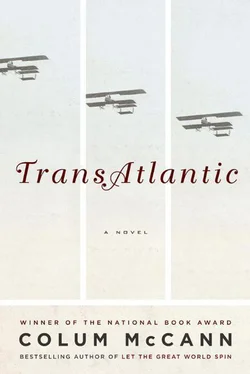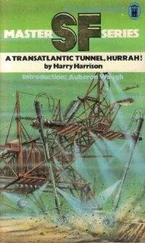A set of headlights swept across the ceiling. The darkness had fallen so very quickly. Cars on the outside road. Maybe they had been followed. Someone taking photographs perhaps. There was a gap in the curtains, for sure. He turned his body sideways to the window. He put his hand up to his face. Another sweep of headlights went through the room. He cursed himself, knotted his hands tight.
He saw Gerald’s sister step out from the kitchen towards him. Her figure was small, slim, lithe. Her face clarified when she stepped beyond the doorway. Something hard about her eyes. He was surprised by a body odor that rolled from her. Sheila ran her hands along the sideboard. Then she stopped a moment and touched one of the photo frames.
— We lost him about six years ago now, she said.
— Excuse me?
— My husband.
— I’m sorry.
— The North Sea, she said.
Sheila flicked a quick look at the children who were gathered on the carpet near the bay window.
— He was working in the oil fields.
She lowered her voice again.
— We don’t talk about it much in front of the wee uns, she said.
He felt a surge move through him. A gust of thanks. Sheila had intuited his brief terror. He wanted to grasp her hand. The happiness of being wrong. The affirmation of it. But what could he say? He had assumed the worst. Ireland. Always the worst.
He flicked another look out the window.
— Do you mind if we close the curtains, Gerald?
He wanted to sag back in the chair and relax. Amid the teacups and the crockery. He could be cynical tomorrow: always time for that.
He brought the cup to his lips. Already a small skin of cold had formed on the surface of the tea. He glanced at the mantelpiece clock. It was almost ten thirty. Sheila put the kettle on again. The Senator stretched his legs out in front of him. He heard the children moving about on the carpet, whispering amongst themselves. There was something funny at hand, it seemed. Their famous visitor. His American accent? His bearing? The way he dunked his biscuits in his tea perhaps? They were giggling now and he saw a sternness move across Sheila’s face. She glared at her children. They fell quiet. A small curtain seemed to cross her eyes, too.
She cut another slice of fruitcake. Gerald plugged in the electric fire. He had yet another story to tell. The Senator glanced at the clock on the mantelpiece. At eleven in the evening he stood to say good-bye. Again the children giggled.
He reached across to shake hands, but instead she pulled him towards herself in the manner of someone familiar. He thought she was going to kiss him on the cheek.
— You want me to darn that? Sheila asked quietly in his ear.
— Excuse me?
Another whisper.
— Ye’ll not be taking your shoes off in Stormont, now, will ye?
He glanced down to see the hole in the heel of his right sock. She was laughing now, her face tilted up at him.
— It’ll only take me a wee minute, she said.
Later that night on the phone to Heather all he could hear was the laughter down the wire from his wife, and three days later, in an express package that had to be opened and examined by the secret service, five new pairs of plain gray socks, none for Saturdays or Sundays, simply because she wanted him home.
HE SHIFTS HOTELS on the fifth night. There have been rumors and bomb scares. Another strong hint at an assassination attempt. In the morning, he packs his pajamas, his toothbrush, his extra clothes, and in the evening the security team move him across to the Hilton at the waterfront. From there he will go to his favorite, the Culloden.
Little matter. All his time is in the Stormont offices now. Those dark corridors.
On the phone he talks to Blair and Ahern. President Clinton, too. A letter of best wishes arrives from Nelson Mandela. A handwritten note from Václav Havel. Late in the evening, he and Holkeri pace the halls. Light leaks from under doors. Whispers in the back shadows. Waiting for new drafts of sentences, paragraphs, whole documents to come their way. He is reminded of salmon moving the wrong way up against the water. The Kennebec. Its intricacies. The swift curl at the mill. Patches of light in the eddies, standing waves.
WHEN THE DIPLOMATIC pouch arrives from London on Sunday night — two days late — his heart falls through his chest. Strand Two. From Ahern and Blair. He knows the very moment he reads it that it will not work. He gathers with de Chastelain and Holkeri and their staff. A chill coming in on the weather. There is a Frost poem from school days. Whose woods these are I think I know . He hears it again, distantly, brokenly. Miles to go before I sleep . There are times he wishes he could knock an absolute simplicity into the process. Take it or leave it.
He has read whole volumes on the philosophy of nonviolence. How peace had to be understood in all its moral dimensions. The proper coexistence of all existents. The excluded middle ground. The surpassing of personality. The vanity of cultural superiority. The tension between individual conscience and collective responsibility. The need to proclaim again and again what has already been said.
Later, at the press conference, he holds up his hands in a gesture of calm. He has practiced this. There is an art to it: keep the hands open enough not to frame the face, spread the fingers wide in a gesture of appeasement. The ability to deflect a question without swatting it away. He allows a long silence before answering. Speaks evenly, calmly. Moves his gaze around the room. Slowly. Judicially. He tries not to adjust his glasses on his nose — too much a gesture of fabrication. He already knows he will absorb the blame. It is his delay, his fault, his carelessness. No matter. They must go on.
He thanks the prime ministers and government officials. They deserve a lot of praise. Tremendous effort. Energy. Concentration. Ardor. Grace. We urge everyone to proceed. Common sense dictates. Discussions are ongoing. Can you rephrase your question? That assertion, sir, is incorrect.
Flashbulbs pop. A mobile phone rings. A frisson of nervous laughter skitters around the room. He keeps his answers vague. Tiptoes around the truth. He is careful not to let the politeness reel off into anger. His job is to tamp the confusion down. Return again to the moment of simplicity. Reiterate what they came for. The people of Northern Ireland have waited long enough.
What they need are the signatures. After that, they will negotiate the peace. Years of wrangling still to come, he knows. No magic wand. All he wants is to get the metal nibs striking against the page. But really what he would like now, more than anything, is to walk out from the press conference into the sunlight, a morning and evening jammed together, so that there is rise and fall at the same time, east and west. It strikes him at moments like this that he is a man of crossword puzzles, pajamas, slippers. All he really wants is to get on a plane to New York, enter the lobby of the apartment on Sixty-Seventh Street, step into his own second chance, that proper silence of fatherhood.
HE WRITES HEATHER an email to say that he will be home soon. Easter Saturday at the latest. He is careful with the note, in case it is intercepted. No flourishes. No professions of love. He clicks Send , and then goes for a walk in Lady Dixon Park in the middle of the night, amongst the roses, rolling a pebble along at his feet, his security detail behind him, matching him step for step.
It is a photo that’s used in the newspapers a few days later. For the Easter editions. The Senator rolling a stone with his foot. In the gloom. Away from a cave of light. On Good Friday itself.
Nothing, in Northern Ireland — not even the obvious — ever escapes attention.
Читать дальше












